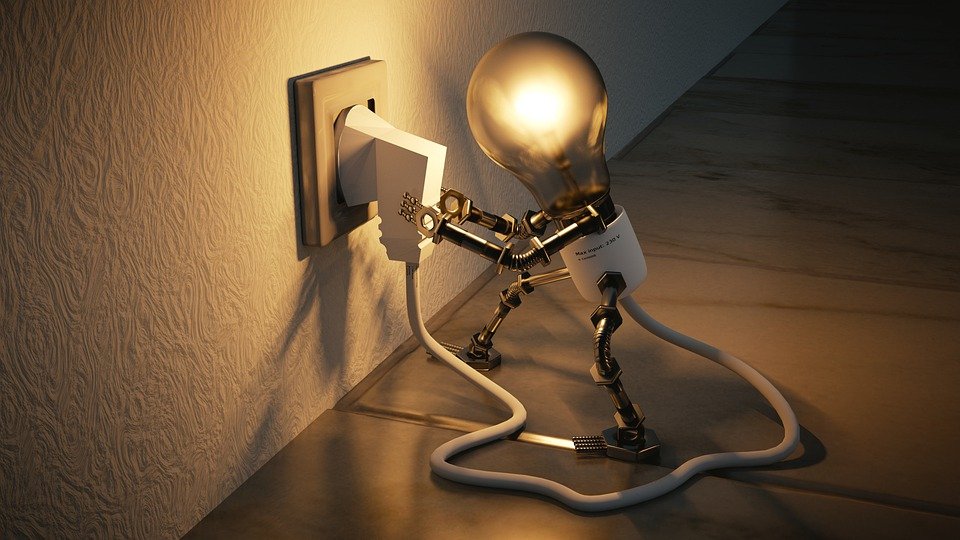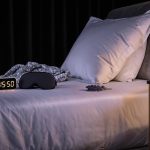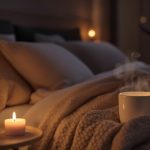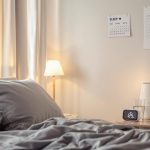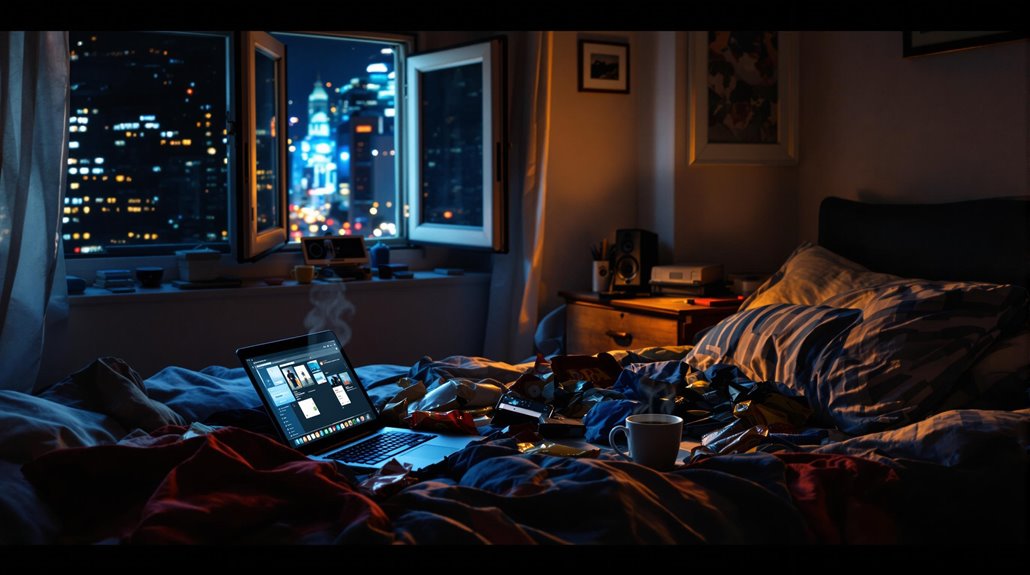
You’re likely making sleep hygiene mistakes that disrupt your rest and health. Avoid varying your sleep schedule; it’s essential to maintain consistent sleep and wake times. Engaging in stimulating activities at night, like exercising, can hinder relaxation. Create a restful environment with proper lighting and temperature. Don’t skip a calming bedtime routine, and avoid heavy meals or caffeine close to bedtime. Turn off electronic devices an hour before sleep to reduce blue light exposure. Overeating, improper hydration, and stressful evening activities further disrupt sleep. There’s more to explore about improving your sleep habits and boosting your well-being.
Inconsistent Sleep Schedules
Inconsistent sleep schedules can wreak havoc on your body and mind. You might feel liberated by the spontaneity of varied bedtimes, but the truth is, irregular sleep patterns put your health at risk. For every hour your sleep schedule varies, you increase your chances of developing metabolic disorders by 27%. Disrupting your natural circadian alignment not only elevates the risk of diabetes, obesity, and high blood pressure but also impairs your body’s metabolic functions, leading to weight gain and poor insulin sensitivity. Chronic sleep issues can exacerbate cardiovascular health, emphasizing the importance of early detection of sleep disorders like obstructive sleep apnea (OSA).
Achieving sleep consistency helps combat these adverse effects. Sticking to regular sleep and wake times maintains your body’s circadian alignment, allowing you to dodge sluggish energy levels and impulsive behavior. Consistent sleep schedules also regulate your internal body clock, preventing social jetlag and ensuring better rest. Without consistency, your body’s natural clock is thrown off, leading to pronounced mood swings and even depression over time.
Maintaining sleep consistency is a powerful yet underrated strategy for enhancing mental clarity and emotional stability. An aligned circadian rhythm improves your daily functioning, boosts your work performance, and reduces the chances of accidents.
Embrace sleep consistency as a tool for liberation, freeing yourself from the shackles of preventable health issues and mental fog. It’s time to awaken a healthier version of yourself.
Stimulating Activities at Night
Engaging in stimulating activities at night is a surefire way to sabotage your sleep. When you indulge in screen time via phones or computers before bed, you’re exposing yourself to blue light that tricks your brain and suppresses melatonin production. Instead, establish bedtime rituals that prioritize calming activities, helping you foster a strong connection between your bed and sleep. Remember that environmental factors, such as bedroom conditions, significantly impact sleep quality. Turn off your devices at least an hour before bedtime, allowing your mind to gently ease into restfulness rather than remain alert. Proper hydration strategies can also impact sleep quality as dehydration can indirectly affect restfulness.
Late-night exercise might seem liberating, but it can be detrimental to your sleep. While physical activity is essential, intense workouts close to bedtime stimulate the release of hormones that could lead to insomnia. Choose the afternoon or early evening for your exercise regime. If you still crave some form of movement before bed, gentle stretches or relaxation exercises can soothe rather than stir your senses.
Additionally, steer clear of heavy nighttime meals and drinks loaded with caffeine or alcohol. These choices can lead to indigestion and disrupt your sleep. Instead, respect your body’s natural rhythm by adhering to calming bedtime rituals that nurture peace and prepare you for a restful night.
Disruptive Bedtime Environment
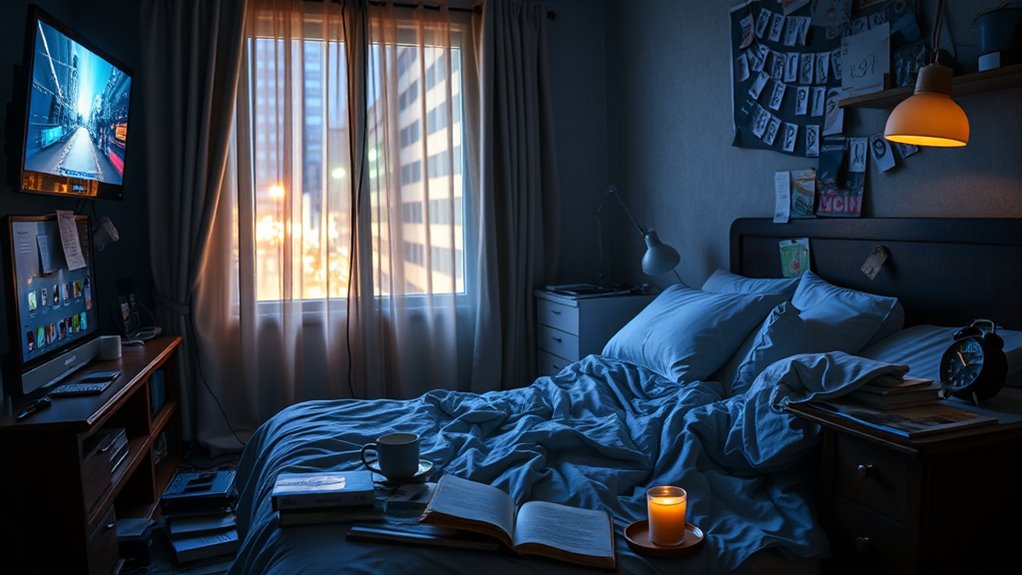
Creating a peaceful bedtime environment is essential for getting a good night’s sleep. You deserve a sanctuary that frees you from external chaos.
Begin by addressing light disruptions. Use lighting solutions like blackout curtains or eye masks to block out unwanted light from windows or digital devices. It helps your brain recognize that it’s nighttime, aligning with your natural circadian rhythm.
Temperature control is another vital factor. Your body thrives in a cooler environment, ideally between 60-67 degrees Fahrenheit. Avoid hot baths before bed and let your bedroom become the cool escape that your body craves for restful sleep.
Noise, even if you’re unaware, can compromise deep sleep quality. Implement soundproofing techniques such as using earplugs or a white noise machine to mask disturbances and lull you into tranquility.
Revamp your bedroom’s setup to maximize peace:
- Keep the space clutter-free to invite serenity.
- Reserve the bedroom solely for sleep and intimacy.
- Remove electronics like TVs and computers.
- Opt for comfortable mattresses and pillows.
- Consider serene paint colors for walls.
Engaging in mindfulness meditation can further enhance your sleep quality by reducing overthinking and promoting relaxation. Embrace these changes and watch your disruptive environment transform into a personal utopia that liberates your sleep.
Lack of Relaxation Routine
Establishing a lack of a relaxation routine may be contributing to why you struggle with falling asleep or staying asleep. Imagine ending your day feeling calm and free from tension. A consistent pre-sleep routine isn’t just a mundane task; it’s your nightly ticket to liberation from stress.
By incorporating relaxation techniques and calming activities, you teach your body to shift from the frenzy of the day to the tranquility of the night. Start by exploring what calms you: whether it’s reading, meditating, or soaking in a warm bath—activities that naturally unwind your tense muscles and bustling mind.
To maximize this newfound freedom, guarantee the activities you choose are soothing, so you’re not tempted to engage in stimulating habits like intense exercise or late-night TV. Did you know that stress often sabotages your ability to enjoy quality rest?
Combat it with calming practices like journaling, gratitude exercises, or using a meditation app. These techniques signal to your body it’s time to release the day’s pressures and embrace sleep. Remember that exposure to natural light is essential during the day to regulate your sleep-wake cycle and enhance your nighttime relaxation routine.
Poor Eating Before Bed
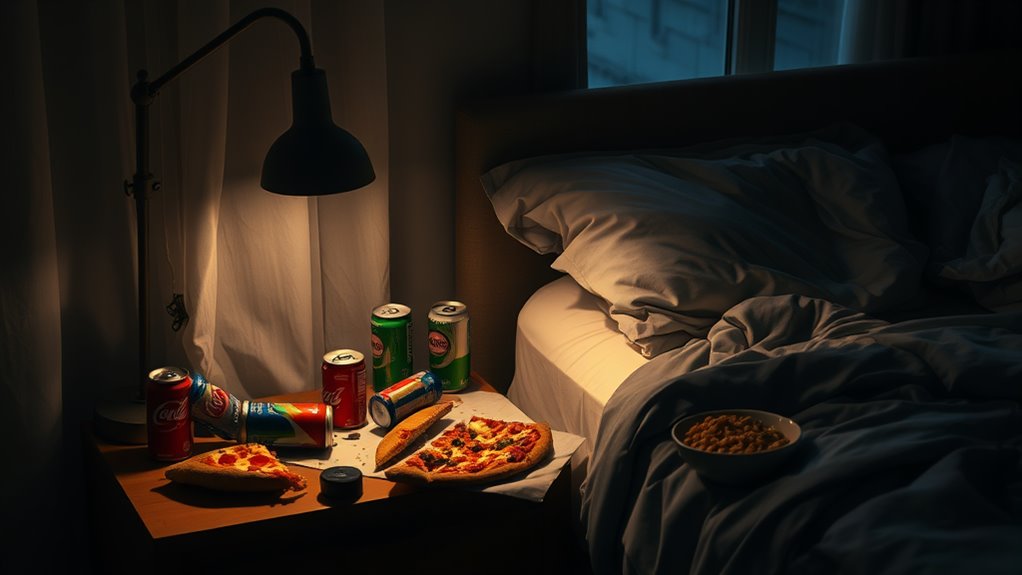
After embracing a calming pre-sleep routine, it’s important to examine your eating habits as they can also impact sleep quality. Consuming food or drink too close to bedtime can greatly disrupt your sleep, making you more prone to waking up during the night.
Meal timing plays a critical role here; experts recommend finishing your last meal 2-4 hours before hitting the sack for ideal sleep benefits. Eating just an hour before bed may seem harmless, but it’s been linked to frequent awakenings, reducing sleep efficiency.
Additionally, reducing sugar and refined carbs in your evening meals can prevent insulin spikes that may interfere with your body’s ability to stay asleep.
To truly enjoy a restful night, consider these practical tips:
- Avoid high-fat foods: They’re likely to cause discomfort and disrupt sleep.
- Steer clear of spicy and acidic foods: They can trigger acid reflux and heartburn.
- Limit caffeine and alcohol: Both can wreck your sleep patterns.
- Refrain from heavy meals: Large intakes of calories or sugars delay falling asleep.
- Choose healthier bedtime snacks: Opt for nutrient-dense foods that help stabilize blood sugar levels.
Counterproductive Sleep Techniques
When you constantly check the clock during the night, it can heighten anxiety and make it difficult to sleep.
Furthermore, mismanaged nap times in the afternoon or evening can decrease your chances of feeling tired at night.
It’s crucial to manage these habits to improve your overall sleep quality and establish a more effective sleep routine.
Avoid Clock-Watching Habits
In the pursuit of a restful night, clock-watching habits can be one of the most counterproductive sleep techniques. Staring at the clock fuels anxiety and stress, creating a formidable barrier between you and a peaceful slumber. The ticking of time isn’t just noise—it’s an amplifier of insomnia symptoms, pushing you into a cycle of restless nights and dependence on sleep aids.
To liberate yourself from this cycle, consider clock removal as an essential step toward anxiety reduction.
Here’s how to break free from the clutches of time:
- Remove or cover all bedroom clocks to decrease pre-sleep anxiety.
- Say goodbye to smartphones and smartwatches in the bedroom that tempt you to check the time.
- Try the 15-minute rule: if you’re awake for over 15 minutes, get up and engage in a quiet activity.
- Develop a relaxing bedtime routine that doesn’t involve time-checking.
- Ensure a dark, cool sleeping environment, free from the glow of digital displays.
Mismanaged Nap Times
Many people make the mistake of mismanaging nap times, which can greatly disrupt your sleep quality. It’s essential to pay attention to nap duration and timing to embrace the freedom that comes from restful nights.
By keeping naps between 20-30 minutes, you can avoid sleep inertia, that groggy haze which drags you down after waking. Longer naps, especially those over 60 minutes, not only disrupt your nighttime sleep but might also increase the risk of health issues like high blood pressure.
When it comes to nap timing, drifting off after 3 p.m. can make it challenging to fall asleep at night. Instead, aim for early afternoon naps; they boost alertness without compromising your nighttime rest.
Consistency is key—stick to a napping schedule that aligns with your body’s natural rhythm to steer clear of sleep fragmentation.
Electronic Device Usage
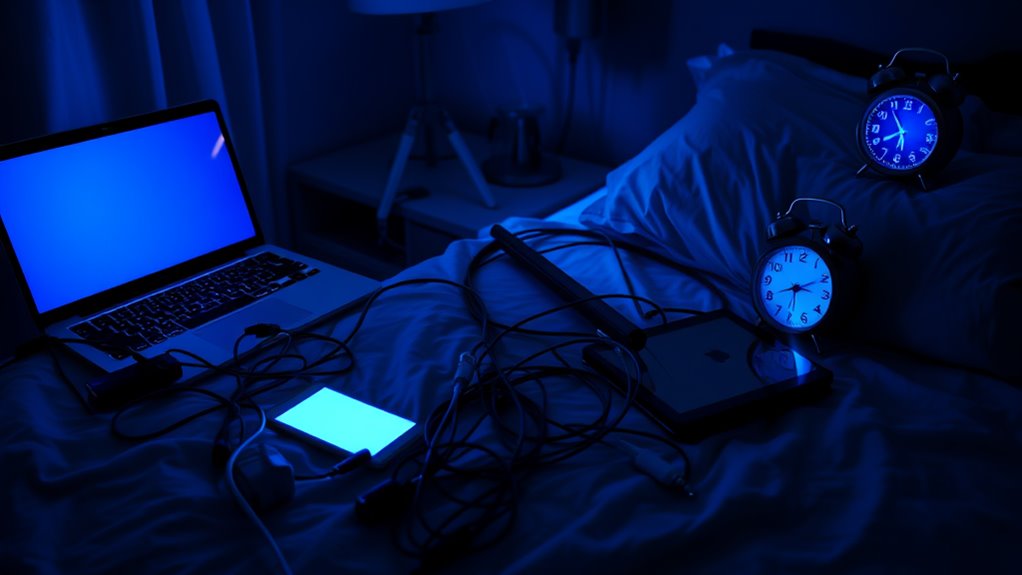
One of the biggest challenges to maintaining good sleep hygiene is electronic device usage before bedtime. Engaging with your smartphone, tablet, or laptop in the evening exposes you to blue light, which can affect your sleep.
Blue light has a way of tricking your brain into staying awake by suppressing melatonin production and delaying your circadian rhythm. It’s no wonder you’re more alert and find it harder to drift off if you’re glued to the screen for more than 1.5 hours before bed.
To liberate yourself from screen time’s clutches, consider these strategies:
- Dim screens or switch to night modes to minimize blue light exposure.
- Use blue light blocking glasses to counteract the effects of your devices.
- Engage in passive activities like e-book reading, which are less likely to impact sleep.
- Designate non-screen time at least 30 to 60 minutes before you hit the hay.
- Set up a sleep-friendly environment by keeping devices out of the bedroom.
Caffeine and Alcohol Consumption
As you endeavor for better sleep, be mindful of how caffeine and alcohol consumption impact your rest. Caffeine sensitivity varies, but even a cup of coffee six hours before bed can steal 41 precious minutes of slumber. This stimulant blocks adenosine receptors, making it harder for you to drift into deep sleep, and can delay REM sleep by up to two hours.
To reclaim your freedom from restless nights, aim to have that last coffee or energy drink no later than early afternoon.
Alcohol might seem like a tempting nightcap, but beware. It disrupts your sleep cycle as its metabolism kicks in. Initially, it might help you relax, but as your body processes it, sleep becomes fragmented and less restorative.
This can shackle you to a pattern of tossing and turning instead of liberating you with rejuvenating rest.
Understanding your personal caffeine sensitivity and how your body metabolizes alcohol can arm you with the insights needed to break free from poor sleep quality.
Stressful Evening Activities
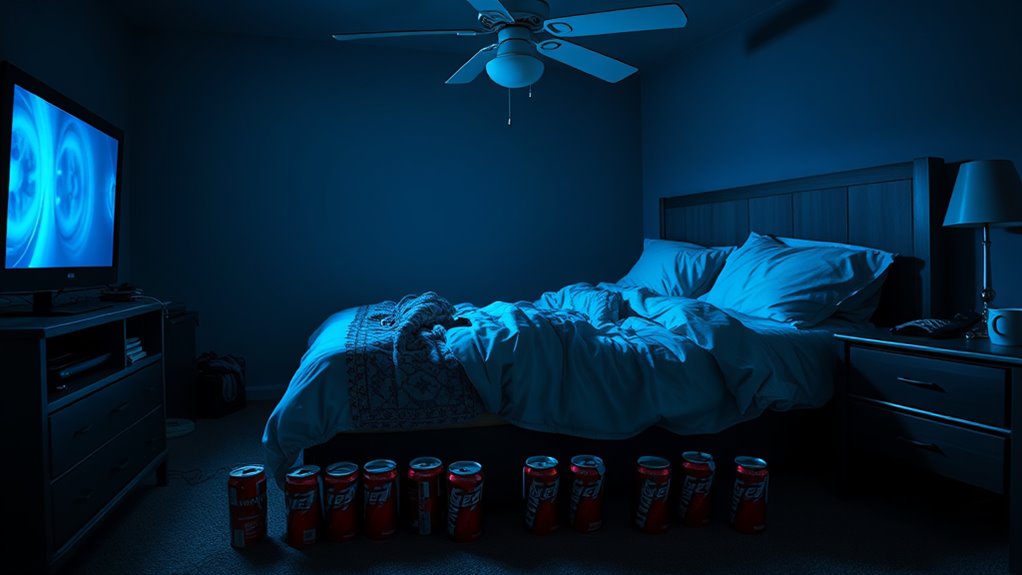
You mightn’t realize it, but evening workouts can boost alertness and disrupt your sleep.
Scrolling on your phone or finishing work late at night also increases stress and keeps your mind active when it should be winding down.
It’s crucial to rethink these habits and replace them with activities that promote relaxation to improve your sleep quality.
Evening Workout Pitfalls
Imagine finishing a vigorous workout just before bedtime, only to find yourself tossing and turning. Evening exercise can influence your sleep, depending on workout intensity and timing.
While moderate-intensity evening workouts may not trouble your slumber if wrapped up 1-2 hours before bed, high-intensity evening exercise sessions can wreak havoc on your ability to fall asleep.
- Exercise Type Matters: Activities like running or cycling can enhance sleep outcomes. Opt for those if you prefer evening workouts.
- Timing is Key: End vigorous workouts well before bedtime to avoid increased heart rate and adrenaline, keeping you alert.
- Listen to Your Body: Individual chronotypes decide when exercise feels best—night owls might find late-day exercise suits them.
- Core Temperature: Exercise raises it, mimicking daytime signals and delaying sleep onset unless there’s ample cooldown time.
- Endorphins and Alertness: The brain’s pastime pool of endorphins post-exercise can make unwinding elusive.
Pre-Bed Phone Habits
While choosing the right workout can impact your sleep quality, your evening phone habits play a significant role too. Excessive screen time subjects you to blue light that suppresses melatonin, leading to delayed sleep onset. To combat this, consider a digital detox by switching on blue light filters or wearing protective glasses. This not only eases the shift to sleep but also nurtures a healthier circadian rhythm.
Activities | Impact | Solution
— | — | —
Active phone use | Brain stimulation | Engage in offline activities
Passive phone use | Less disruptive | Opt for calming content
Multitasking | Disruptive | Limit to single screen
Even scrolling through social media or checking news stimulates your brain, making it tougher to unwind. Instead, allocate time for relaxation away from screens to embrace a sense of liberation from digital overload. Creating a buffer before bedtime could mean setting “Do Not Disturb” or moving your phone to another room, reducing temptation and distractions.
This conscious effort to minimize screen time isn’t just about better sleep—it’s a step toward reclaiming control over your life. Prioritize these digital detox habits before bedtime to wake up refreshed and ready to seize the day with newfound freedom.
Late-Night Work Stress
Ever wonder why a good night’s sleep feels elusive despite your bedtime routine? Late-night work stress might be the culprit.
It’s vital to strike a work-life balance that prioritizes your health. When work demands follow you into the night, stress management becomes critical for restoring peace. Ruminating over tasks and decisions from the office disrupts sleep patterns, leading to insomnia and fatigue.
Consider these strategies to transform your evenings:
- Set boundaries: Reserve the bedroom solely for rest. Leave work behind, ensuring a clear distinction between professional and personal time.
- Create a wind-down ritual: Engage in calming activities like a warm bath, reading, or mindfulness exercises to signal it’s time to relax.
- Limit stimulants: Avoid caffeine, nicotine, and alcohol, as they can keep anxiety heightened and sleep elusive.
- Write a to-do list: Jotting down tasks for the next day can ease cognitive overload and reduce bedtime rumination.
- Cultivate self-compassion: Allow yourself to unwind. Practicing mindfulness or meditation can alleviate stress and improve sleep quality.
Overeating and Hydration Issues
Steering through the terrain of sleep hygiene involves sidestepping common pitfalls like overeating and improper hydration. When you eat large meals close to bedtime, you’re setting yourself up for discomfort. Overeating effects include indigestion, heartburn, and interrupted sleep.
Foods rich in fats and proteins linger in your digestive tract, making it difficult to drift off peacefully. Indulging in sugary or low-fiber foods can further disrupt your sleep, leading to fragmented rest and daytime drowsiness. By waiting about 3-4 hours after eating, you give your body the time it needs to process your meal without interfering with a restful night’s sleep.
On the hydration front, adequate water intake is essential. Dehydration can quietly disrupt your sleep. Your body needs sufficient hydration to maintain peak function, including temperature regulation, which is key to good sleep.
To maximize the benefits, employ effective hydration strategies throughout the day—drink water regularly and consume hydrating foods like watermelon and oranges. Limiting caffeine and alcohol can also reduce sleep interruptions.


